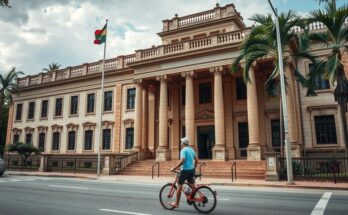Senegal’s snap legislative election on November 17 showcased a commitment to democracy following prior unrest. The successful transition to President Bassirou Diomaye Faye, marked by 61.3% voter turnout, signifies citizen engagement and institutional resilience. Yet, challenges such as corruption and governance issues persist, necessitating continuous efforts to uphold democratic integrity. Senegal’s journey offers valuable lessons for other African countries.
Senegal’s recent snap legislative election on November 17, sparked by President Bassirou Diomaye Faye, marks a significant development in the nation’s democratic journey. Following mass protests against former President Macky Sall’s attempt to postpone elections, this transition exemplifies a commitment to constitutional governance. With a participation rate of 61.3%, the electoral process showcased the citizens’ determination to uphold democratic tenets. Faye’s election is viewed positively, reflecting a rejection of unconstitutional practices and a reaffirmation of democracy’s strength in Senegal, particularly when contrasted with challenges faced by other African nations. Despite the positive developments, Senegal’s democratic institutions grapple with underlying issues such as corruption and weak governance. While the country performs better than some peers in West Africa, problems like nepotism and administrative corruption persist. Faye’s administration pledges to break from the past by promoting transparency and inclusive governance. The resilience of Senegal’s democracy is evident, yet it requires ongoing efforts to combat corruption and ensure electoral integrity. Furthermore, the protection of judicial independence and the promotion of media freedom are critical for sustaining democratic values in Senegal. The electoral process and peaceful transition of power serve as a powerful lesson for other nations in Africa seeking stability and political accountability. The successful elections underscore the importance of upholding democratic norms, engaging a diverse range of stakeholders in governance, and fostering civic education. The commitment of the Senegalese populace to their democratic rights is commendable and must be preserved for future generations. In summary, Senegal demonstrates a robust commitment to democracy through recent elections that promise a pathway for political change while balancing challenges. The country’s experience provides valuable insights into maintaining democratic integrity amidst adversity and the importance of civic engagement in achieving a vibrant political landscape.
The article delves into Senegal’s electoral landscape, specifically the recent legislative elections that followed a period of political upheaval. After former President Macky Sall’s controversial decision to defer elections, which led to substantial unrest, Bassirou Diomaye Faye was elected amid a backdrop of calls for democratic accountability. This sets the context for assessing Senegal’s democratic resilience and challenges in comparison to the political climates of other African nations.
In conclusion, the recent elections in Senegal not only reflect a commitment to democratic principles but also signify a pivotal moment for political legitimacy in the country. The high voter turnout and the peaceful transition of power signify a potential for continued democratic governance. To maintain this momentum, however, Senegal must address persistent issues of corruption and ensure robust systems are in place to uphold rule of law and accountability. The experiences of Senegal serve as an instructive example for other nations striving for democratic progress.
Original Source: theconversation.com




